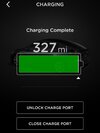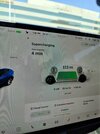Welcome to Tesla Motors Club
Discuss Tesla's Model S, Model 3, Model X, Model Y, Cybertruck, Roadster and More.
Register
Install the app
How to install the app on iOS
You can install our site as a web app on your iOS device by utilizing the Add to Home Screen feature in Safari. Please see this thread for more details on this.
Note: This feature may not be available in some browsers.
-
Want to remove ads? Register an account and login to see fewer ads, and become a Supporting Member to remove almost all ads.
You are using an out of date browser. It may not display this or other websites correctly.
You should upgrade or use an alternative browser.
You should upgrade or use an alternative browser.
Model Y full charge range
- Thread starter Fishy
- Start date
babbit
Member
I wouldn’t worry. I’m at 289, so just 2 miles more than you. However, I noticed that on my same work commute, my Wh/mi has been about 10% less than when my battery was at 316. That leads me to believe that no matter what your battery is showing, your actual range doesn’t really change.316? Makes my 287 look pretty bad. I was gentle on my battery too. Oh well, someone has to be on the left side of the statistical distro.
whisperingshad
Active Member
whisperingshad
Active Member
2 weeks ago. Normally i dont charge to over 80ish%. My daily driving is about 100 miles total. i have about that much do do today but dropping off for service tommorow morning and dont want to worry about it being charged enough.
silverstoned83
Member
What I'm trying to understand is how many are jumping to conclusions and blaming battery degradation without doing any thorough real world tests before making such a claim.
I highly doubt that anyone goes through what Bjorn does to properly evaluate battery degredation, after all, it's a very time consuming process. In other words, this thread is meaningless and misleading until someone puts in the effort before coming to any conclusions.
I highly doubt that anyone goes through what Bjorn does to properly evaluate battery degredation, after all, it's a very time consuming process. In other words, this thread is meaningless and misleading until someone puts in the effort before coming to any conclusions.
Last edited:
whisperingshad
Active Member
I think main thing is normal battery concepts. Don't charge to full all the time. Let it go down to low sometimes too.
What I'm trying to understand is how many are jumping to conclusions and blaming battery degradation without doing any thorough real world tests before making such a claim.
I highly doubt that anyone goes through what Bjorn does to properly evaluate battery degredation, after all, it's a very time consuming process. In other words, this thread is meaningless and misleading until someone puts in the effort before coming to any conclusions.
Scanmytesla gives the kWh of the battery as reported by the BMS. Mine was 77.8 kWh when new and is now 69 kWh. Seems like ~11% degradation to me. Do you draw a different conclusion? It'd be great to find out my battery isn't degraded that much.
Hmmm - I have almost 8k miles on my Model Y. Using the data from Tesla Fi, I am now down to 287 miles on a full charge - and declining rapidly in the hot weather. (It's already 90-100 degrees in deep south Texas.)Lithium batteries temporarily lose a little capacity during the winter months due to the colder temps. All EV’s have this reaction to cold weather. After enough exposure to the cold temperatures, the BMS will begin to reflect less range. In my i3, this equates to about a 25% decrease in estimated range every winter. As temps begin to warm up, the max charge range estimate begins to improve until it reaches the advertised max range.
Hexo09
Member
Would a January build have 316 or 326 miles in theory? Changed my display to miles for the first time since my second day of ownership, at 50% it gave me 158 miles. So theoretically 316 at 100%. 2700 miles. 55 degrees outside.
As pointed out by several people, I don't think that this number impacts the actual range anyway, it is more based on what the BMS "sees". If you keep your car between 50-80% without letting it drop to a low battery or charging up >90% ever, it will probably tend to be inaccurate. Battery degradation has been proven pretty low with 2012 Model S's, with the battery technology being lesser back then. I doubt a Model Y would actually lose 10% in the first couple thousand miles, unless you're only supercharging it.
As pointed out by several people, I don't think that this number impacts the actual range anyway, it is more based on what the BMS "sees". If you keep your car between 50-80% without letting it drop to a low battery or charging up >90% ever, it will probably tend to be inaccurate. Battery degradation has been proven pretty low with 2012 Model S's, with the battery technology being lesser back then. I doubt a Model Y would actually lose 10% in the first couple thousand miles, unless you're only supercharging it.
frankvb
Active Member
It's not based on the build date, but on the software version.The change from 316 to 326 happened middle of 2020 (can't recall the exact month). It was basically due to the software version improving the efficiency, battery capacity did not change.Would a January build have 316 or 326 miles in theory? Changed my display to miles for the first time since my second day of ownership, at 50% it gave me 158 miles. So theoretically 316 at 100%. 2700 miles. 55 degrees outside.
I'm down to 298 miles after almost one year and 7K miles, but it is very much possible that the BMS is too pessimistic.
2 weeks ago..I have a question for those that are concerned about battery degredation.. When was the last time you went on a trip that was over 200 miles one way starting from a full charge?
dinonugget
Member
I have 4200 miles on my 6-month-old MYLR and my 100% distance is 305 miles just this morning. When the car was new, I distinctly remember it reading 326 miles when the slider is moved to 100%.
Would be really curious to see if the battery calibration will really reverse course and start to read higher miles with summer approaching, or if I'm just watching my Long Range become a Standard Range literally in front of my eyes with hardly any driving.
Would be really curious to see if the battery calibration will really reverse course and start to read higher miles with summer approaching, or if I'm just watching my Long Range become a Standard Range literally in front of my eyes with hardly any driving.
I've tried various BMS calibration techniques from the M3 thread. Nothing seems to make much difference, and any difference I see lasts only a few cycles. I suspect my battery has indeed degraded 11%. As long as that rate slows way down (or drops 19% more percent for a warranty claim), I'm not too worried about it. Dropping another 11% in the next couple of years, yet not getting to 30% would be disappointing. My BMS-reported capacity slide hasn't slowed yet. Time will tell. (BTW, I don't supercharge normally, have charged to 70% - 90% daily, and have been below 10% only twice to calibrate the BMS, and to 100% just before a few trips.)
I think the MS battery degradation was skewed by holding some degradation reserve capacity in software. From many, many posts on the M3 and MY forums, it appears 10% -15% degradation in the first two years is fairly common. My car is now down 12%, double the average 6% drop average in the 18 other similar vehicles in this Teslafi set. Again, I'm not too worried about it, but it is a little disconcerting.
BTW, the sharp 7 mile bump up at ~4200 miles was the software range bump when they moved the fleet from 316 miles to 326.

I think the MS battery degradation was skewed by holding some degradation reserve capacity in software. From many, many posts on the M3 and MY forums, it appears 10% -15% degradation in the first two years is fairly common. My car is now down 12%, double the average 6% drop average in the 18 other similar vehicles in this Teslafi set. Again, I'm not too worried about it, but it is a little disconcerting.
BTW, the sharp 7 mile bump up at ~4200 miles was the software range bump when they moved the fleet from 316 miles to 326.
Last edited:
silverstoned83
Member
Scanmytesla gives the kWh of the battery as reported by the BMS. Mine was 77.8 kWh when new and is now 69 kWh. Seems like ~11% degradation to me. Do you draw a different conclusion? It'd be great to find out my battery isn't degraded that much.
This is not enough data to make such a conclusion. Until you go on a long +300 mile trip, starting from a full charge, and try to extract the most range possible using appropriate techniques, you’re making a big assumption about the health of your battery.
Similar threads
- Replies
- 6
- Views
- 541
- Locked
- Replies
- 70
- Views
- 5K
- Replies
- 10
- Views
- 1K
- Replies
- 143
- Views
- 5K
- Replies
- 10
- Views
- 564




